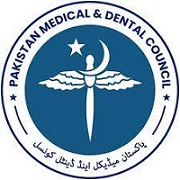STAPHYLOCOCCAL CASSETTE CHROMOSOME MEC TYPES IN NASALLY CARRIED METHICILLIN RESISTANT STAPHYLOCOCCUS AUREUS ISOLATES OF HEALTHCARE WORKERS IN A TERTIARY CARE HOSPITAL: A CROSS-SECTIONAL STUDY
Abstract
Objective: To determine the frequency and SCCmec type of nasally carried MRSA in HCWs of a tertiary care hospital.
Methods: Nasal swabs were collected from three hundred and eighty healthcare workers working in various clinical wards of Lahore General Hospital, Lahore. The phenotypic resistance to methicillin was determined using Cefoxitin disk 30 µg. All the isolates showing Cefoxitin resistance were confirmed for mecA gene and typed for SCCmec I, II, III, IV (a, b, c, d) and V by PCR. DNA sequencing was done for random isolates for all the SCCmec types recovered in the present study.
Results: Out of 380 nasal samples, 89 (23.42%) cultures yielded the growth of S. aureus out of which 31 (34.83%) were MRSA. The overall frequency of MRSA among all the HCWs was 8.2%. Overall, 47 SCCmec elements were found in total 29 MRSA isolates. Out of 29 MRSA isolates, 13 (44.82%) were hospital acquired, 7 (24.13%) were community acquired and 9 (31.03%) isolates had SCCmec types of both hospital acquired and community acquired origins.
Conclusion: The colonized healthcare workers are harboring Hospital-acquired MRSA more frequently and can act as being acting as mixing bowls of different SCCmec genes. Our study emphasizes the need for the formulation of regular nasal decolonization policies for effective infection control within our healthcare setups.






